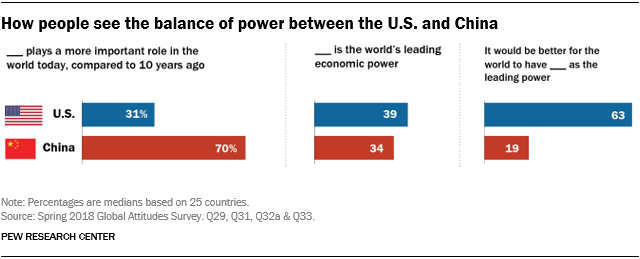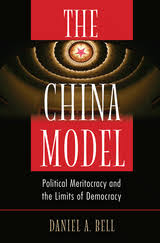
Credit: Pew Center
Recent technological, diplomatic, investment and infrastructure successes have made China attractive to smaller countries not only as an economic partner but as an ideological standard-bearer, notes Elizabeth C. Economy, C.V. Starr Senior Fellow and Director for Asia Studies at the Council on Foreign Relations.
 Xi Jinping claims that the so-called China model offers countries disenchanted with Western-style market democracy a different path to development. In countries such as Ethiopia, Tanzania, and Uganda, the message resonates, and officials are learning from their Chinese counterparts how to control the media and constrain political dissent, she writes for Foreign Affairs.
Xi Jinping claims that the so-called China model offers countries disenchanted with Western-style market democracy a different path to development. In countries such as Ethiopia, Tanzania, and Uganda, the message resonates, and officials are learning from their Chinese counterparts how to control the media and constrain political dissent, she writes for Foreign Affairs.
“It’s not just that liberal democracy is retreating under pressure from demagogic politicians exploiting the stresses of globalization, rising inequality, economic insecurity, job displacement, immigration, and so on,” argues Larry Diamond, author of a prescient new book, “Ill Winds: Saving Democracy From Russian Rage, Chinese Ambition, and American Complacency.” “It’s that authoritarian forces everywhere perceive that there is no longer any price to pay for ruling as nastily as they want.”
But China’s economic downturn has stoked social discontent, adds Economy, a Distinguished Visiting Fellow at Stanford University’s Hoover Institution:
Multiprovince strikes have galvanized crane operators as well as workers in food delivery and van delivery. A nationwide trucker strike erupted in the summer of 2018…. highlighting the potentially disruptive effect of the gig economy on the Chinese work force. Most troubling to Xi, however, was likely the news that university Marxist groups were converging on Shenzhen’s Jasic Technology plant in support of efforts to organize independent labor unions. The  protest was quickly shut down, but the moral legitimacy of its demands remains to be addressed. At the same time, broad social movements that cross age, gender, and class, such as those advocating women’s and LGBTQ rights, have arisen alongside the traditional protests around the environment, wages, and pensions.
protest was quickly shut down, but the moral legitimacy of its demands remains to be addressed. At the same time, broad social movements that cross age, gender, and class, such as those advocating women’s and LGBTQ rights, have arisen alongside the traditional protests around the environment, wages, and pensions.
Amid all this turmoil, Xi’s efforts to project Chinese soft power [or what a National Endowment for Democracy report calls ‘sharp power’] have fallen flat, she adds, noting that in the spring 2018 Pew Research Center polls [above], a 25-country median of 63 percent preferred a world in which the U.S. was the leading power, while only 19 percent favored China. RTWT







